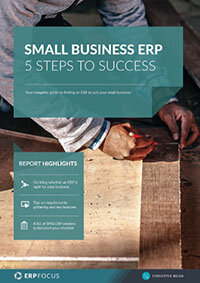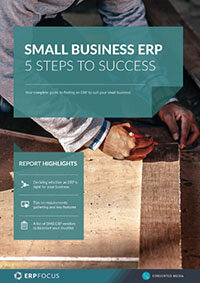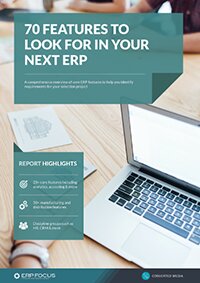Five features small businesses should look for in an ERP
Your business has twelve people working and not all are full time employees. there’s a contractor here and there, a couple of freelancers and occasionally an intern too.
Revenue is increasing but slower than you would hope (what changes?) but your gut tells you the business will be much larger in the near future. You have limped along with no ERP but you know that an ERP will be necessary to achieve the growth you need at some point soon.
ERP selection can take a fair amount of time, so don’t wait until the situation gets desperate before looking for one that’s suitable. Here are a few key features to look out for while shopping around:
Ease of use
All your people handle more than one job and none are ERP experts. A system with the ease of Quickbooks would be ideal but you know you will need more power and sophistication to attract that next round of financing. You can staff your ERP selection and implementation team with your entire payroll and let all of them try the ERP on for size to get the most feedback. Likely, not all will be happy but if they know the need for ERP, they can make excellent suggestion.
Find the right ERP for your small business with this step-by-step guide
Scalability
While you have an idea what the business will be like in the future there remain many unknowns. Look for ERP that can grow to where you expect to be. Ask your ERP vendors and consultants for references to businesses like yours today and like yours in the future. Most good ERP systems will qualify but you do not want to select one that limits your chart of accounts to only 100 or your customer list to any fixed number.
Compliance to industry regulations
Every business needs to comply with rules and regulations from outside. GAAP is an example of financial compliance. Paying taxes at local, state, and federal levels is compliance. If you deal with hazardous materials, you need environmental compliance. Think carefully listing your business’ needs. ERP systems will help you stay compliant.
In particular, Generally Accepted Accounting Principles are important in your future. These principles are set you your government and your public accounting leaders. A business that uses GAAP can be compared to any other similar businesses. The numbers might be smaller but the ratios will be comparable. Most ERP systems will meet this qualifications and it should be one of the more important features to ensure you have.
A comprehensive set of core features
ERP systems are typically built of a collection of modules you license. Finance, sales, cash payments are a few that all businesses need. Human resources and payroll are others that fit almost any business. Depending on your business, you might also need inventory, production, or supply chain modules. There are wide varieties of modules available that will match the needs of most businesses. While you are small, you might be able to meet your requirements using spreadsheets planning to switch that part of your business to ERP sometime in the future. ERP modularity allows you to get what you need today and add more modules as needed.
Free white paper

Small business ERP: five steps to success

Featured white papers
Related articles
-

Top ERP systems for small businesses
Which ERP solutions are best for small business needs? Information on features, scalability and m...
-

Secret KPI: Why Your ERP Implementation Team Matters More Than Software
Learn how Godlan ensures successful ERP implementation for manufacturers with proven strategies &...
-

How to use ERP project management tools to improve efficiency
Advice on using your ERP project management tools to their full potential


